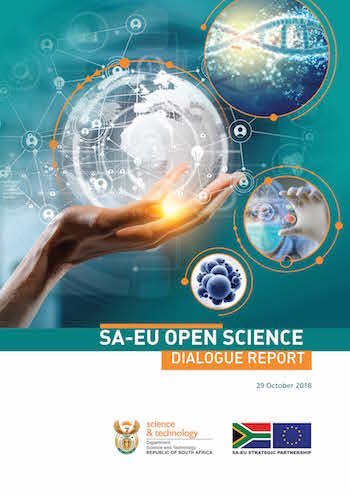SA-EU Open Science Dialogue Report available

(the following excerpt is taken from the Executive Summary of the Dialogue Report)

Open science is good for: (i) science itself: it improves efficiency and the verifiability of science, it brings transparency, and it allows inter-disciplinarity; (ii) the economy: with wider access to, and increased re-use of scientific information by all, and in particular, by industry and innovative companies; and (iii) society: it brings broader, faster, transparent and equal access for citizens, and contributes to increased societal impact of science and research.
The raison d'etre for developing an Open Science Framework for South Africa is the recognition by the Department of Science and Technology (DST) that Open Science is a game changer for South Africa insofar as it seeks to create an ecosystem in which scientific research is more cumulative, better supported by data, more transparent with faster and more universal access to results, and underpinned by a greater focus on scientific integrity and the public’s trust in science.
However, a key challenge facing Open Science in South Africa is the issue of fragmentation, and absence of a common sense of direction. Hence, the decision to develop an overarching national framework on Open Science. The Open Science Framework for South Africa articulates a set of guidelines and principles for publicly funded open science and open data for the South African context. The Open Science Framework also includes action points for key stakeholders such as relevant government departments, universities, science councils, civil society and industry. Mainstreaming science that is open to all and that is integrated across disciplines will enable South Africa to take advantage of the benefits of collaborative, transdisciplinary approaches to knowledge development and sharing.
The three pillars of Open Science - open access to scientific information, open data and open engagement with society (including firms) - all require changes to traditional scientific processes and behaviours that need to be supported by policy mandates and appropriate incentive, monitoring and reward systems.
In South Africa, Open Science also has tremendous potential for creating a more inclusive society. An important aspect of Open Science relates to how the public is taking a more active role in science – what is referred to in the literature as ‘citizen science’. Open Science can create unprecedented connections between researchers and the public, allowing for a vibrant citizen science movement, poised to have transformative effects on how research is executed.
Open Science holds great promise in strengthening the competitiveness of the overall South African science and research system. It has the potential to speed up knowledge transfer among scientists and scientific disciplines, to foster the growth of new types of scientific cooperation and to stimulate collaborative research.
In this document, an Open Science Framework is presented. The intention of the framework is to support the DST in the formulation of an Open Science policy and more broadly, to assist all actors involved in the R&D process with the adoption of Open Science practices and principles. The document covers the process which was followed in developing the framework, the proposed rationale for Open Science in South Africa, the policy and technology context, the objectives for its adoption, normative principles and guidelines and finally a set of policy recommendations.
